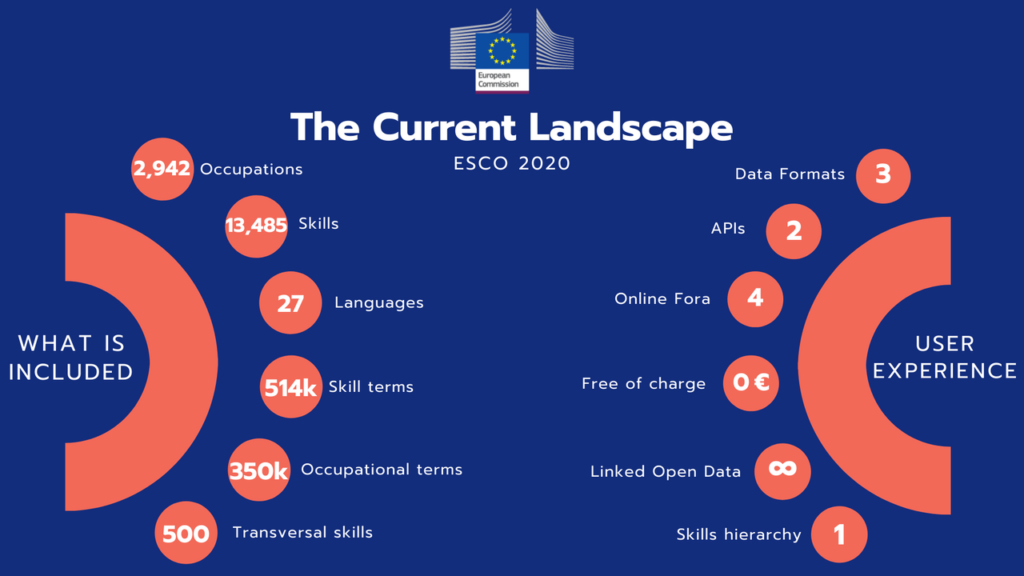For insights on this approach can benefit your business and increase the effectiveness, flexibility and performance of your team

Jeff Fig
Founder
The European classification of Skills, Competences, Qualifications and Occupations (ESCO).
ESCO is effectively a dictionary, describing, pinpointing and classifying occupations and skills relevant for the EU job market and training opportunities.
ESCO are a European institution established to add some order to the European job market.
In order to support jobs across the EU ESCO have been trying to categorising all occupations and skills and map these in the different languages to each other in order to understand the major job roles and skills used.
ESCO run an online platform that is available to track and integrate with their findings in order to align and leverage advantages of consolidated job descriptions


The systems ESCO has put in place online means that their data can be interrogated digitally.
Integration with the different systems and platforms means that ESCO SKILLS PROFILE data can be used to help suggest relevant job roles and support search functionality that could be used to return results that contain more relevant job rolls or training that could potentially identify ways a candidate could improve their SKILLS PROFILE to more competitive or better than their fellow applicants

ESCO contains accurate descriptions of job roles and skills that can be used to draft job descriptions and CV enabling businesses to identify the widest range of accurate candidates or the candidates can be sure that they are applying, confident that they have the skills need so wasting less time and effort on both sides of the equation.
By SKILLS PROFILE matching either side of the job fulfilment process is essential for the effectiveness of the process, both employers to find the right people for their vacancies and jobseekers to find the right jobs for their skills.

The analysis of the SKILL PROFILE gaps across the market means that business and education institutions alike can identify the skills needed by business, the in demand skills that will inspire candidates to train and maximise their earning potentials.
By adapting to demand candidates can change their CVs reactively and train accordingly. Knowledge is power and being able to forecast the SKILL PROFILE gaps of the future will mean that candidates are better prepared for the the labour markets of tomorrow.
ESCO data is available in 26 different languages. This allows both jobseekers and employers to better communicate about skills, training and jobs in any chosen European language.
European public and private employment services can now offer their services across countries, borders and languages. This aligns with the wider cultural changes in a global market place. They can better support people who want to work in another European country as well as countries around the world that are European language based.
Modern times require the best and more efficient tools for learners and workers to manage and develop their career throughout their life. The European Commission is responding to this need by launching a modernised Europass.
From 1 July 2020, all European citizens will be able to benefit from an innovative and user-friendly platform to manage their careers from a lifelong perspective. Current services offered by Europass such as the creation of a profile to record skills, qualifications, interests and experiences, are now strengthened with tailored suggestions of courses and jobs. This information will also include links to national services to support finding jobs and learning opportunities.

More than ever before in history people are not only changing job roles and their associated skills but people are also looking further afield to find challenging and interesting roles.
People with high demand skills are often now more flexible in their locations or with better technology allowing people to work from home more effectively, job seekers can look in other areas and countries for suitable roles.
Digital tools allow people to take roles and engage in training from anywhere in the world so having linked skills around the EU and the global allows people to effectively sell specific skills and help recruiters match candidates.
Accuracy in matching skills, roles and candidates helps to ensure a level playing field for everyone involved. Transferable skills, level wage scales, more appropriate training opportunities and flexibility in the job market will mean that both individuals and business will be able to quickly find the skills they need to achieve their business goals as well as individuals having more opportunities and a wider range of choice.
http://ec.europa.eu/avservices/video/player.cfm?sitelang=en&ref=I163051
http://ec.europa.eu/avservices/video/player.cfm?sitelang=en&ref=I162745
http://ec.europa.eu/avservices/video/player.cfm?sitelang=en&ref=I161740
http://ec.europa.eu/avservices/video/player.cfm?sitelang=en&ref=I144718
http://ec.europa.eu/avservices/video/player.cfm?sitelang=en&ref=I144716
ESCO goes live conference. ESCO is the multilingual classification of European Skills, Competences, Qualifications and Occupations. It identifies and categorises skills and competences, qualifications and occupations relevant for the EU labour market and education and training, in 22 European languages. The system provides occupational profiles showing the relationships between occupations, skills, competences and qualifications. ESCO has been developed in an open IT format and is available for everyone to use free of charge

